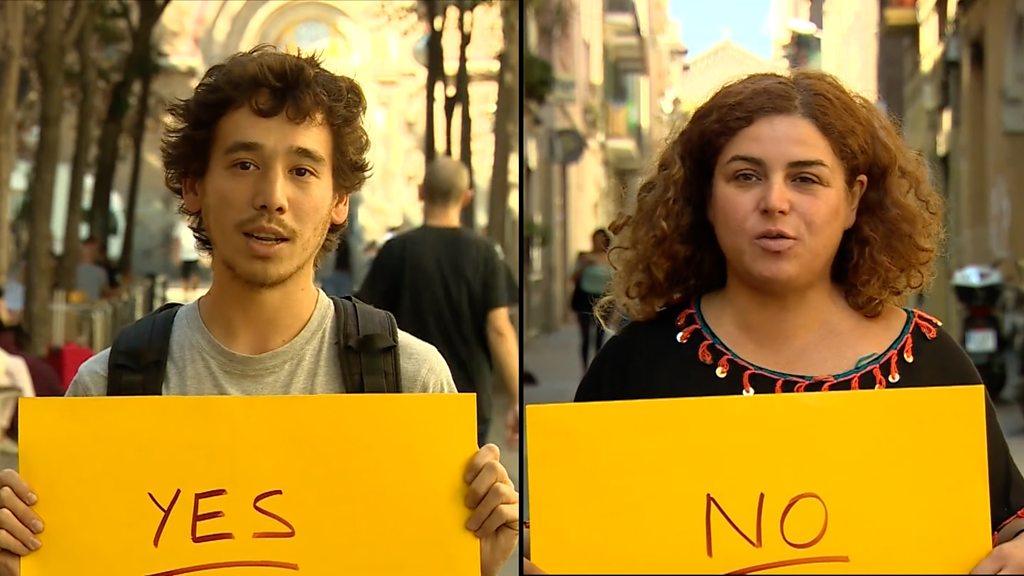Madrid scorns Catalan leader's independence statement
- Published
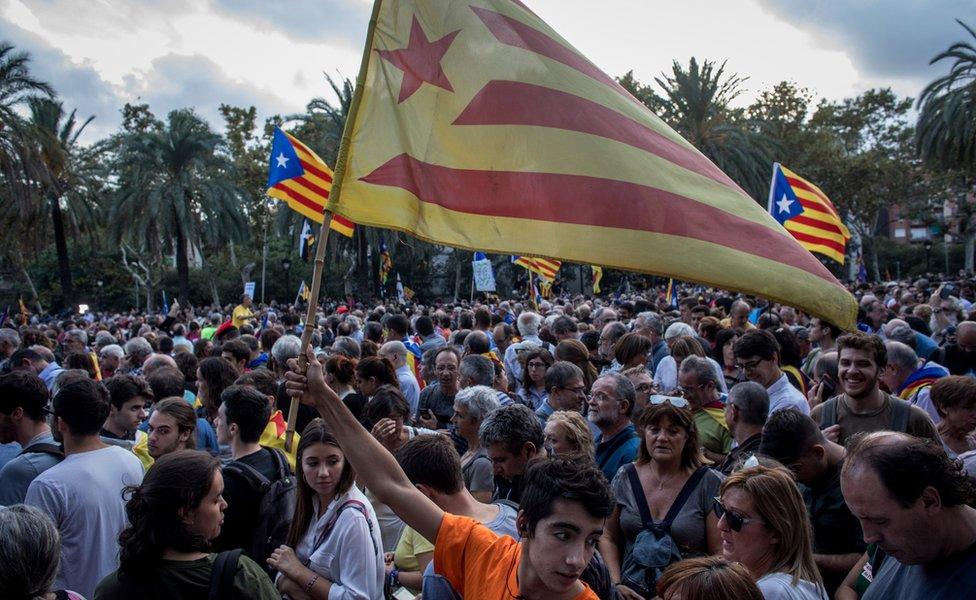
A pro-independence crowd gathered in Barcelona to hear Carles Puigdemont's address
The Spanish government has rejected a statement of independence signed by Catalan leader Carles Puigdemont and dismissed calls for mediation.
Spain's deputy prime minister described Mr Puigdemont as someone "who does not know where he is, where he's going".
Prime Minister Mariano Rajoy is holding an emergency cabinet meeting to discuss the government's next steps.
Mr Puigdemont signed a declaration of independence on Tuesday, but halted implementation to allow negotiations.
There had been speculation that the Catalan president might declare independence and put the move into effect, plunging Spain into an even deeper political crisis.
Catalan leader seeks talks to secure independence
Spain has been in turmoil since a disputed referendum on 1 October which was declared invalid by the country's Constitutional Court.
Addressing the Catalan parliament in Barcelona on Tuesday evening, Mr Puigdemont said the autonomous region had won the right to be independent as a result of the vote.
"We call on international states and organisations to recognise the Catalan republic as an independent and sovereign state," he said.
He said the "people's will" was to break away from Madrid, but he also said he wanted to "de-escalate" the tension around the issue.
"I propose suspending the effects of the declaration of independence to undertake talks in the coming weeks without which it is not possible to reach an agreed solution," Mr Puigdemont told MPs.
He and other Catalan leaders then signed the declaration of independence. It is not clear if the declaration has any legal status.
Crowds of independence supporters in Barcelona cheered Mr Puigdemont's initial remarks, but many expressed disappointment as he clarified his stance.

Three potential speeches - BBC's Gavin Lee in Barcelona

Sources involved in the talks say Mr Puigdemont drafted three potential speeches covering three possible outcomes ahead of the speech he delivered last night.
The first draft declared a motion for immediate unilateral independence that parliament would vote on within 48 hours. Some members of the coalition government threatened to walk in that event, arguing that that kind of language was too strong and would provoke an immediate response of force from the Spanish government.
The second argued for a symbolic declaration of independence, but expressed no intent to push ahead with plans to separate. This time members of the left-wing CUP party who support a minority Catalan separatist government threatened to walk out.
The speech that was delivered appears to be the third and final draft, which suspends any declaration of independence, and is said to have been influenced by the intervention of the EU Council President Donald Tusk, who urged Mr Puigdemont "not to announce a decision that makes dialogue impossible".
The Catalan government appears to have read this as a sign that the EU could be open to future dialogue, even if Spain is not.

In Madrid, Spanish Deputy Prime Minister Soraya Saenz de Santamaria rejected Mr Puigdemont's proposal for talks through an international mediator.
"Neither Mr Puigdemont nor anybody else can claim... to impose mediation," she said.
"After having come so far, and taken Catalonia to the greatest level of tension in its history, President Puigdemont has now subjected his autonomous region to its greatest level of uncertainty.
"The speech the president... gave today is that of a person who does not know where he is, where he's going, nor who he wants to go there with."
Spain's Justice Minister Rafael Catala reiterated the government's position that the referendum was illegal and its results invalid.

How has the Spanish press reacted?
Ara (Barcelona - centre-left, pro-independence) says the Catalan leader "risks the unity of pro-independence groupings in order to try to achieve mediation for a negotiation" with the Spanish state.
El País (Madrid - centrist, unionist) says the government has been studying the application of Article 155 - which would suspend Catalonia's autonomy - for days.
El Mundo (Madrid - centre-right, unionist) says the Spanish government could declare a state of emergency if it considers there is a serious risk of public disorder but says triggering Article 155 is the most likely measure.
La Vanguardia (Barcelona - centre-right, pro-independence) says that in attempting to find a middle way between proclaiming independence and maintaining the status quo, Mr Puigdemont has created "confusion and chaos".
El Periódico (Barcelona - centre-left, unionist) says Mr Puigdemont's speech has sent Catalonia into "political limbo".

Almost 90% of voters backed independence with a turnout of 43%, Catalan officials say. Anti-independence voters largely boycotted the ballot and there were several reports of irregularities.
National police were involved in violent scenes as they tried to stop the vote taking place.
Ahead of Mr Puigdemont's address, influential figures including Barcelona's mayor Ada Colau and European Council President Donald Tusk had urged him to step back from declaring independence.
Catalonia is is one of Spain's wealthiest regions, but a stream of companies has announced plans to move head offices out of Catalonia in response to the crisis.
The European Union has made clear that should Catalonia split from Spain, the region would cease to be part of the EU.
What do Scottish nationalists think about Catalonia?

Are you in Catalonia? What do you think of the latest developments? E-mail us at haveyoursay@bbc.co.uk, external
You can also contact us in the following ways:
Tweet: @BBC_HaveYourSay, external
WhatsApp: +44 7525 900971
Text an SMS or MMS to 61124 (UK) or +44 7624 800 100 (international)
Please read our terms & conditions



- Published2 November 2017
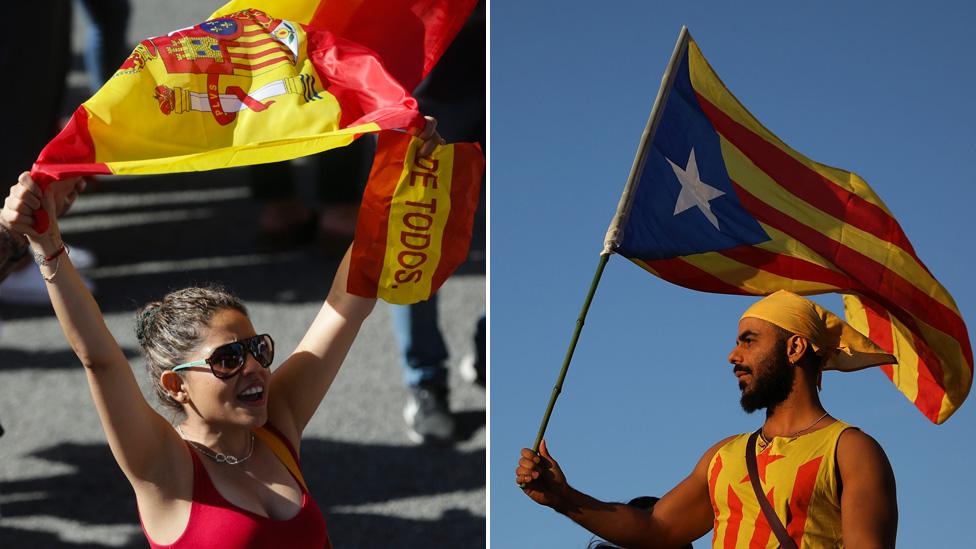
- Published22 December 2017
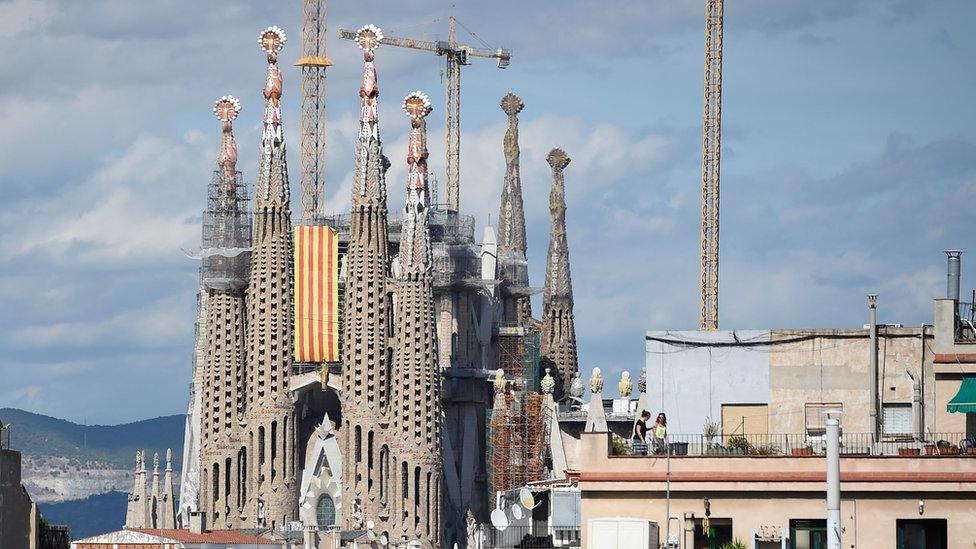
- Published18 October 2019
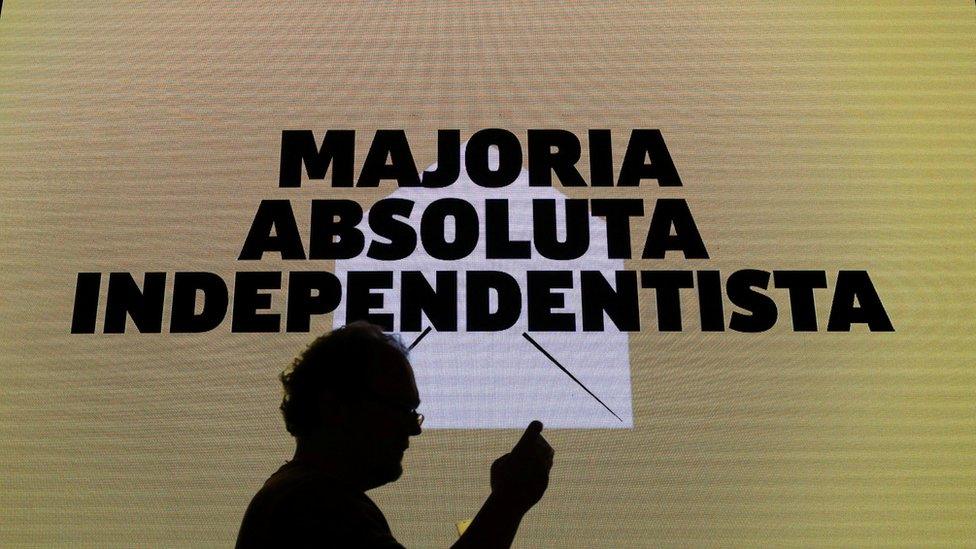
- Published7 October 2017
